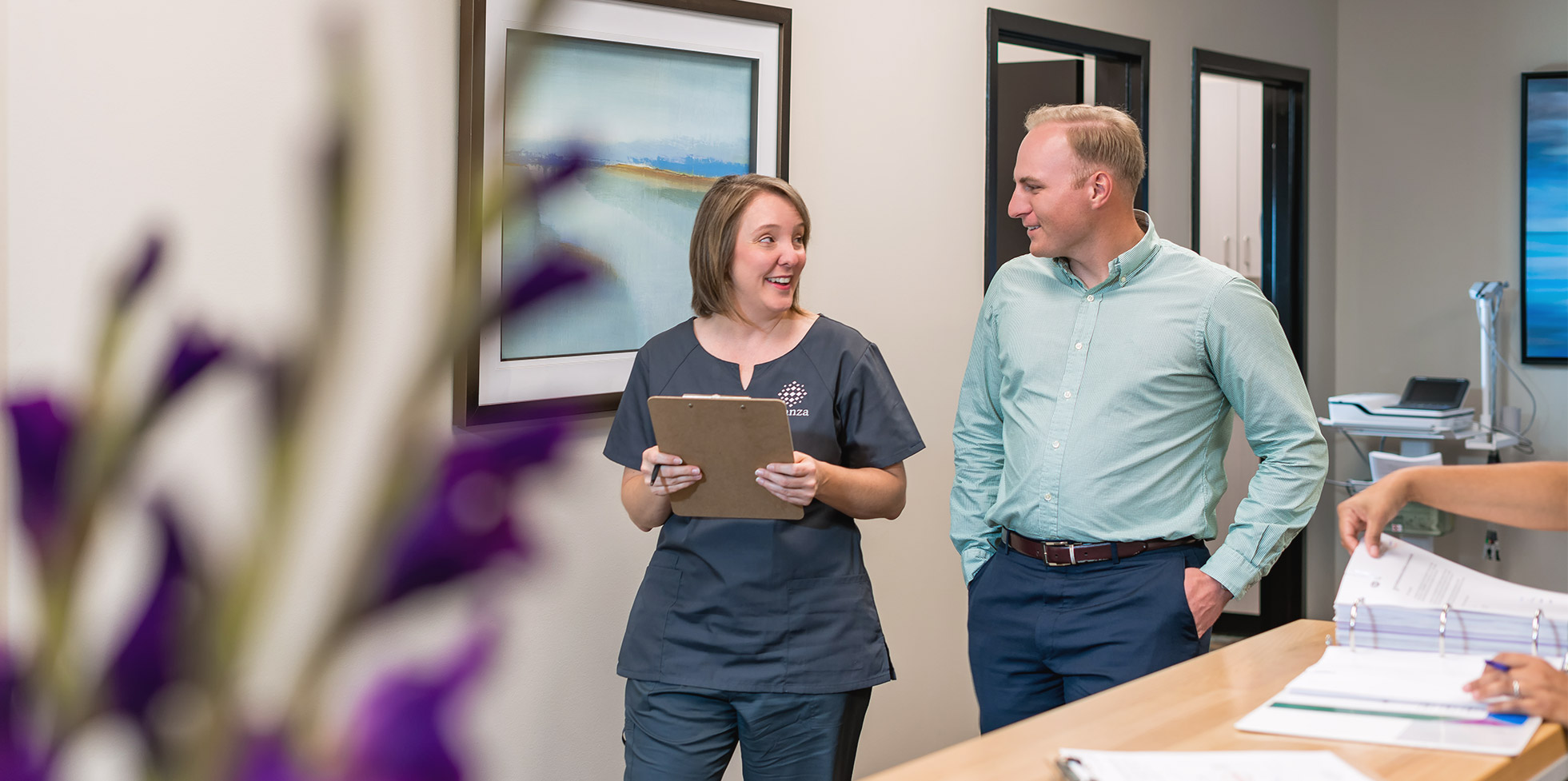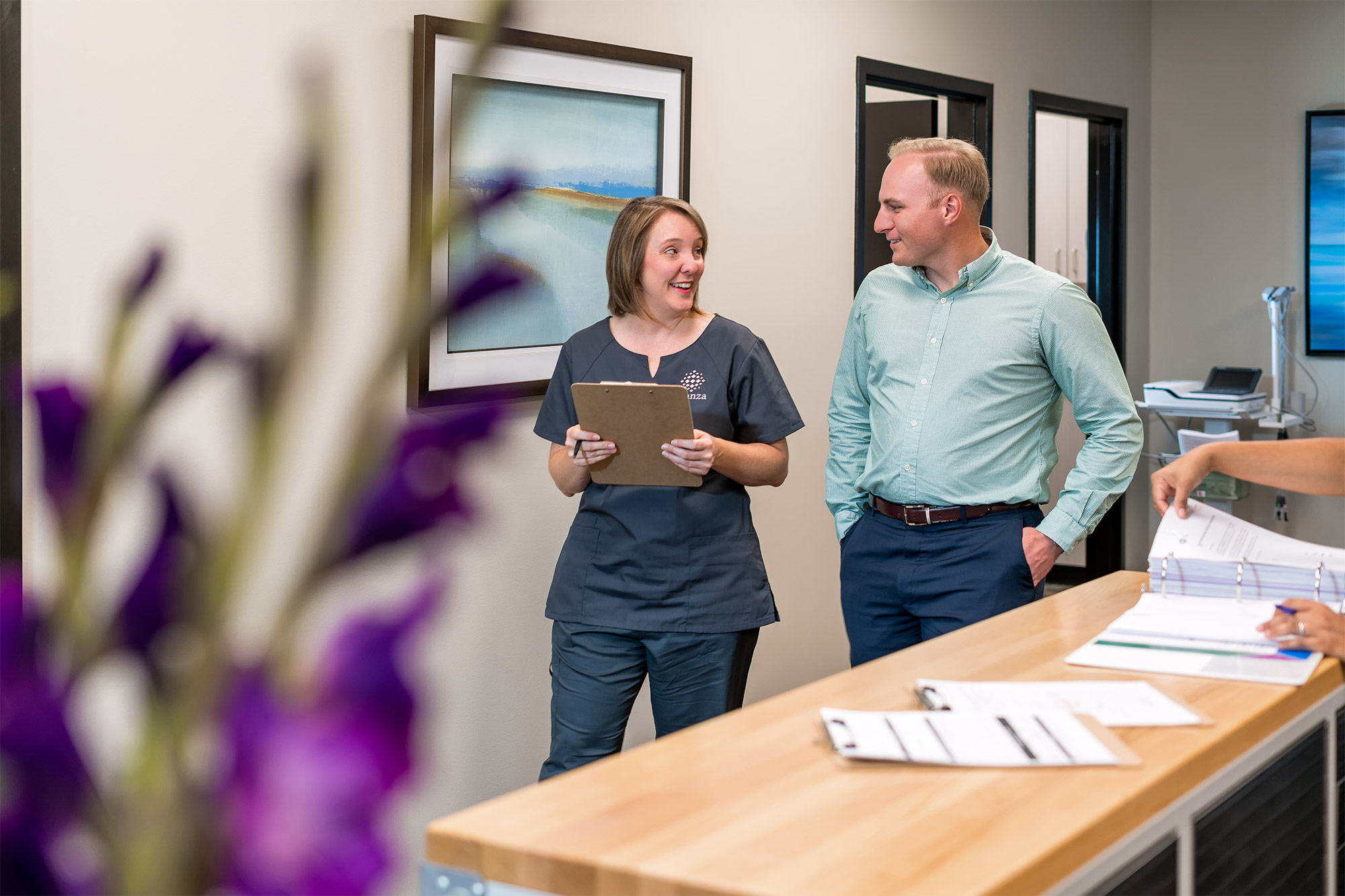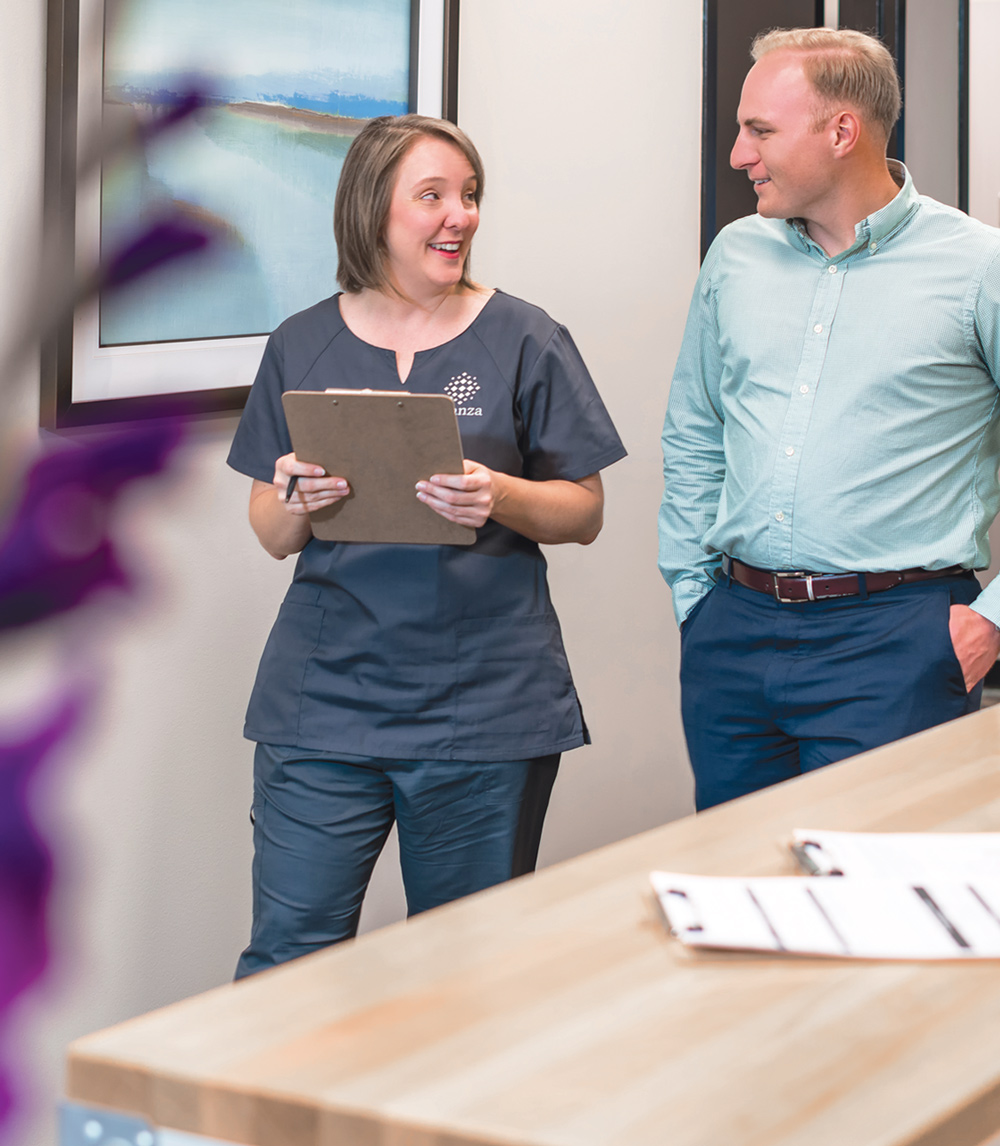Avanza for patients
We brave new frontiers of medicine to create moments of discovery that change the lives of people.
Every journey begins with a single step.
Benefits
Benefits of volunteering in a study include:
- Access to new, promising treatments not yet available to the public
- Take an active role in your own healthcare
- Obtain expert medical care at leading healthcare facilities during the course of the study
- Help others by contributing to medical research
- If you qualify, you may receive compensation for your participation
No aspect of healthcare carrying such potential for benefits can be without risk. At Avanza we make every effort to ensure your health and safety by minimizing risks at every opportunity. Some of the risks associated with clinical trials may include:
- Potential for side-effects or adverse reactions to medications or treatments
- The treatment may not be effective for you
- The protocol may be time-intensive, requiring several trips to the study site, long treatments, hospital stays or complex dosage requirements

Sign up
We encourage you to thoroughly read through the FAQ and Glossary before deciding to participate in a clinical trial. Once you’ve made the determination to pursue participation, you will be able to apply for a study. To determine eligibility, we will require information from you, including:
- Contact Information
- Age
- Weight
- Medical History
- List of Current Medications
To learn more, contact us here or call (850) 477-7900, Monday through Friday between 7:00am and 4:00pm.
Frequently Asked Questions
The Food and Drug Administration (FDA) defines “Clinical Trial” as the scientific term for a test or study of a drug or medical device in people. It is a research study to answer specific questions about vaccines or new therapies or new ways of using known treatments. Clinical trials (also called medical research and research studies) are used to determine whether new drugs or treatments are both safe and effective. These tests are done to see if the product is safe and effective for people to use and are the fastest and safest way to find treatments that work.
Ideas for clinical trials usually come from researchers. Once researchers test new therapies or procedures in the laboratory and get promising results, they begin planning the clinical trials.
Doctors and other health professionals run the tests according to strict rules set by the FDA. The FDA sets the rules to make sure that people who agree to be in the studies are treated as safely as possible. New therapies are tested on people only after laboratory and animal studies show promising results.
Before a prospective treatment is tested on humans, it is thoroughly tested through laboratory and model studies to determine its safety. The tests are run by health professionals and doctors according to strict rules set by the Food and Drug Administration (FDA) to ensure the safety of research participants and volunteers. Before a clinical trial can begin, an Institutional Review board (IRB) reviews and approves the trial protocol. This includes looking at the informed consent and volunteer selection processes, as well as other benefits and risks of participation.
The government has strict guidelines and safeguards to protect people who choose to participate in clinical trials. Every clinical trial in the U.S. must be approved and monitored by an Institutional Review Board (IRB) to make sure the risks are as low as possible and are worth any potential benefits.
Participants can leave the study at any time, for any reason. The informed consent form is NOT a contract. If you plan to stop participating in a study, please let the research team know why you are leaving the study so our office can fill out the proper paperwork for our files.
All clinical trials have guidelines about who can participate in the study and are based on such factors as age, type of disease, medical history, and current medical condition. Anyone can join a clinical trial should they first meet the requirements for the study. Factors that may result in a rejection from a study are called exclusion criteria, while factors that increase your chances of participating in a study are called inclusion criteria. These criteria are used to identify appropriate participants, to keep them safe during the study process, and ensure that researchers will be able to answer the questions they plan to study.
Clinical trials are funded or sponsored by a variety of organizations or individuals such as physicians, medical institutions, foundations, voluntary groups and pharmaceutical companies, in addition to federal agencies such as the National Institute of Health (NIH), the Department of Defense (DoD), and the Department of Veterans Affairs (VA). Trials can take place in a variety of locations, such as hospitals, universities, doctors’ offices or community clinics.
Some clinical trials will compensate you for joining the trial, while others will not. In some programs, researchers will reimburse you for expenses associated with participating in the research, such as transportation, child care, accommodations and meals.
Before making your decision, the FDA recommends asking the following questions (answers will vary depending on the particular study):
- What is the study trying to find out?
- What kinds of tests and exams will I have to take while I’m in the study? How much time do these take? What is involved in each test?
- How often does the study require me to go to the doctor or clinic?
- Will I be hospitalized? If so, how often and for how long?
- What are the costs to me? Will my health insurance pay for it?
- What follow-up will there be?
- What will happen at the end of the study?
- What are my other treatment choices? How do they compare with the treatment being studied?
- What side effects can I expect from the treatment being tested? How do they compare with side effects of standard treatment?
- How long will the study last?
If you would like more information about participating as a volunteer for a clinical study, please contact our office at (850) 477-7900, and a member of our research team will be happy to assist you.
Process
Before the Study
After having chosen a study that suits you in the Available Studies section, you may proceed in one of two ways:
- By phone: Call (850) 477-7900
- By internet: Please complete the form
To participate in a clinical research study, you will need to first attend a screening visit to ensure you are healthy and that you qualify for the study for which you have applied. The screening visit may consist of:
- Registration (your government-issued ID is required)
- Review of the study’s consent documents
- Review of your medical history
- Blood draw
- Urine drug and pregnancy test
- Physical exam and meeting with our physician to review the previously completed documents and provide you with an opportunity to ask questions

Your Stay at Avanza
Some studies may require an extended stay at our clinic for observation. During your stay, you may receive the study treatment and have blood samples and vitals taken. We encourage you to bring items that will help you pass your free time during the study.
We have:
- TVs
- DVD Players
- High Speed Internet
- Board Games & Puzzles
- Newspapers & Magazines
- Dedicated Lounge
- Snacks & Refreshments
- Ping Pong table
You may bring:
- Clothing & Bedding
- Cellphone
- Laptop or Tablet Computer
- MP3 Player with Headphones
- Other leisure items such as knitting, scrapbooking, gaming device
After your Stay
Once you’ve completed your stay, you may be required to come back for additional blood samples and follow-up tests.
Glossary
C
A control is a standard by which experimental observations are evaluated in many clinical trials. One group of patients will be given an experimental drug or treatment, while the control group is given either a standard treatment for the illness or a placebo.
I
A government mandated safety measure enacted by the FDA to ensure that participants are provided with complete information about a study before agreeing to take part. Informed consent ensures that study participants understand all the information and details about the study.
An independent committee of physicians, statisticians, community advocates, and others that ensures that a clinical trial is ethical and the rights of study participants are protected. All institutions that conduct or support biomedical research involving people must, by federal regulation, have an IRB that initially approves and periodically reviews the research.
P
Clinical studies are done in a series of four different phases:
- Phase I: Studies in which researchers test a new drug or treatment in a small group of healthy people (20-80). During this phase, scientists find the best way to give a new treatment, how much they can safely give, and to identify side effects.
- Phase II: Studies in which the study drug or treatment is given to a larger group of people (100-300) that have the disease or condition that the product is going to treat. In this larger group of people, researchers try to see how well the product works against the disease or condition and to further evaluate the treatment’s safety.
- Phase III: If Phase II is successful, the study drug or treatment is given to large groups of people (1,000-3,000) to confirm its effectiveness, monitor side effects, compare it to commonly used treatments, and collect information that will allow the drug or treatment to be used safely.
- Phase IV: These studies may occur after FDA approval and are done after the drug or treatment has been marketed. These studies continue testing the study or drug or treatment to collect information about their effect in various populations and any side effects associated with long-term use.
A placebo is an inactive pill, liquid, or powder that has no treatment value. In clinical trial, experimental treatments are often compared with placebos to assess the treatment’s effectiveness. In some studies, the participants in the control group will receive a placebo instead of an active drug or treatment.
A protocol is a set of established rules that every clinical trial must follow. It describes what types of people may participate in a study, the schedule of tests, procedures, medications, and dosages; as well as the overall length of the study. While in a clinical trial, participants are seen regularly by the research staff to monitor their health and to determine the safety and effectiveness of their treatment.
Myths & Facts
Strict guidelines are in place to ensure that you and all other clinical trial volunteers are treated fairly and ethically. Before an investigational drug can be given to people who volunteer to participate in clinical trials, scientists must complete a rigorous screening and preclinical testing process, and all participants must undergo a thorough informed consent procedure to understand their rights.
There are two principal components of informed consent: an informed consent document includes all the information you will need to help make a decision about taking part in the clinical trial; the informed consent process provides you with ongoing explanations that will help you make educated decisions about whether to begin or continue participating in a trial. Thus, informed consent is an ongoing, interactive discussion, rather than a one-time informational session.
The decision about whether to use a placebo in a clinical trial is based on how serious the illness is, whether an existing treatment is available and other considerations that ensure a high standard of ethics. If you have a serious or life-threatening disease, the best available treatment (called “standard of care) will be used instead of a placebo.
Because clinical trials are designed for research purposes, some level of risk is involved. However, clinical trial participants receive investigational drugs only after they have gone through a testing process that indicates that the drug is likely to be safe and effective for use in humans. Participant safety is a top priority and is frequently and rigorously assessed by researchers for the duration of the trial.
Clinical trials rely on voluntary participation. You are free to leave a clinical trial at any time, even after you have signed an informed consent and received the investigational drug or placebo. However, you should always let the clinical trial team know before you decide to leave the trial because some medicines cannot be stopped safely without a doctor’s help.
The protocol for a clinical trial includes eligibility criteria for who can and cannot take part in the trial. These guidelines are used to identify the people most likely to benefit from the clinical trial and to help ensure that researchers will be able to conduct a thorough investigation of the drug. It is important to note that eligibility criteria are not used to reject you personally. Some eligibility criteria include age group, gender, having a certain type or stage of cancer, having received (or not received) certain medicines in the past, medical history and current health status.
If you choose to participate, you may have the opportunity to receive an investigational drug that is not available to people outside the trial. And, your clinical trial research team will watch you closely and may provide you opportunities for additional tests and lab work that might not be part of your usual care. According to CISCRP’s 2013 Perceptions and Insights study, some trial volunteers also report great personal satisfaction in the fact that they have played a key role in advancing medical science that will help more people live longer, better lives.
Volunteers for clinical trials rarely have to pay any costs related to participating in the trial. There are two types of costs directly associated with a clinical trial: research costs and patient care costs. Research costs are usually covered by the sponsoring organization, and patient care costs are covered by many health insurance carriers. You should ask the clinical trial research team which costs will be your responsibility and also check with your health insurance carrier about the coverage they provide for clinical trial participants before making the decision about participating in a clinical trial.
The National Institutes of Health has an online database that you, your family or doctor can search to find appropriate trials: clinicaltrials.gov. Alternatively, it’s often worth making contact with a patient advocacy organization to help you navigate the process.
Click below to download printable PDF of Myths & Facts.
SIGN UP TO LEARN MORE:

Become a Research Patient
BENEFITS INCLUDE:
- Access to new, promising treatments not yet available to the public
- Take an active role in your own healthcare
- Obtain expert medical care at leading healthcare facilities during the course of the study
- Help others by contributing to medical research
- If you qualify, you may receive compensation for your participation
Participating in clinical research should be a positive, rewarding experience. Of course, no aspect of healthcare carrying such potential for benefits can be without risk, which people should consider before agreeing to take part in a study. Our researchers, as well as ethics committees, are dedicated to ensuring that all participants are treated well and that their safety and wellbeing are respected during the course of a study.
See current studies here or sign up below and an Avanza representative will contact you with more information!
Sign Up to Learn More:
Quality is the cornerstone of our values. We encourage you to complete our Satisfaction Survey below. Please take a moment to tell us about your experience at Avanza.
Partner with us
